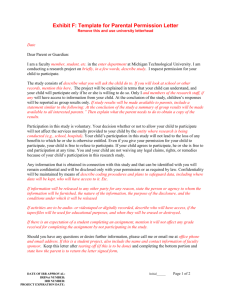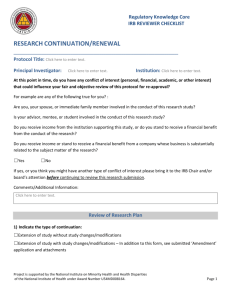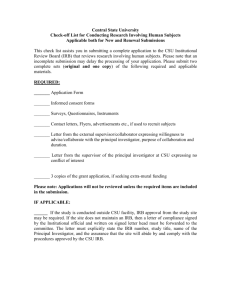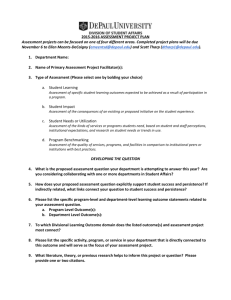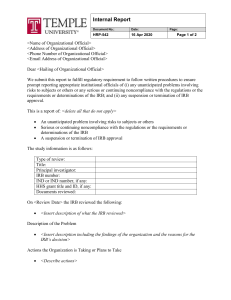7.3 IRB Member Duties
advertisement
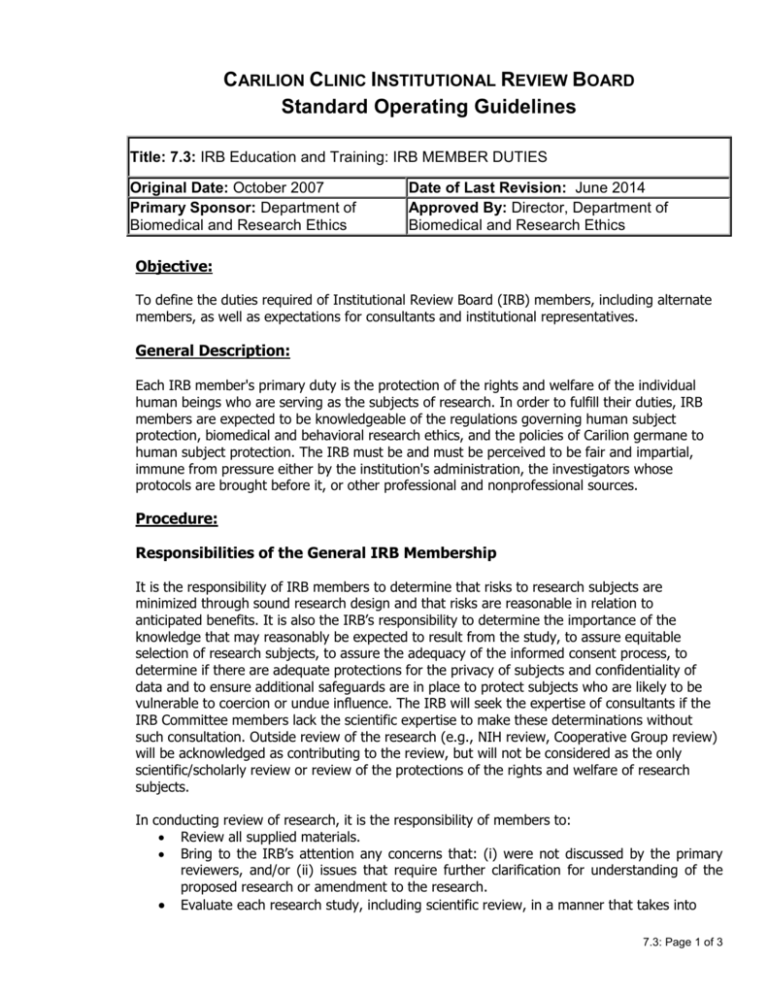
CARILION CLINIC INSTITUTIONAL REVIEW BOARD Standard Operating Guidelines Title: 7.3: IRB Education and Training: IRB MEMBER DUTIES Original Date: October 2007 Primary Sponsor: Department of Biomedical and Research Ethics Date of Last Revision: June 2014 Approved By: Director, Department of Biomedical and Research Ethics Objective: To define the duties required of Institutional Review Board (IRB) members, including alternate members, as well as expectations for consultants and institutional representatives. General Description: Each IRB member's primary duty is the protection of the rights and welfare of the individual human beings who are serving as the subjects of research. In order to fulfill their duties, IRB members are expected to be knowledgeable of the regulations governing human subject protection, biomedical and behavioral research ethics, and the policies of Carilion germane to human subject protection. The IRB must be and must be perceived to be fair and impartial, immune from pressure either by the institution's administration, the investigators whose protocols are brought before it, or other professional and nonprofessional sources. Procedure: Responsibilities of the General IRB Membership It is the responsibility of IRB members to determine that risks to research subjects are minimized through sound research design and that risks are reasonable in relation to anticipated benefits. It is also the IRB’s responsibility to determine the importance of the knowledge that may reasonably be expected to result from the study, to assure equitable selection of research subjects, to assure the adequacy of the informed consent process, to determine if there are adequate protections for the privacy of subjects and confidentiality of data and to ensure additional safeguards are in place to protect subjects who are likely to be vulnerable to coercion or undue influence. The IRB will seek the expertise of consultants if the IRB Committee members lack the scientific expertise to make these determinations without such consultation. Outside review of the research (e.g., NIH review, Cooperative Group review) will be acknowledged as contributing to the review, but will not be considered as the only scientific/scholarly review or review of the protections of the rights and welfare of research subjects. In conducting review of research, it is the responsibility of members to: Review all supplied materials. Bring to the IRB’s attention any concerns that: (i) were not discussed by the primary reviewers, and/or (ii) issues that require further clarification for understanding of the proposed research or amendment to the research. Evaluate each research study, including scientific review, in a manner that takes into 7.3: Page 1 of 3 account the comparative risks and complexity of the study. IRB Member Categories Nonaffiliated member(s): Nonaffiliated members are expected to provide input regarding their knowledge about the local community and be willing to discuss issues and research from that perspective. Non-scientist members: Non-scientist members are expected to provide input on areas germane to their knowledge, expertise and experience, professional and otherwise. For example, members who are lawyers should present the legal views of specific areas that may be discussed, such as exculpatory language or state requirements regarding consent. Non-scientist members should advise the Board if additional expertise in a non-science area is required to assess if the protocol adequately protects the rights and welfare of subjects and to comment on the comprehension of the consent document. Scientist members: Scientist members are expected to contribute to the evaluation of a study on its scientific and statistical merits and standards of practice. These members should also be able to advise the Board if additional expertise in a scientific or non-scientific area is required to assess if the protocol adequately protects the rights and welfare of subjects. Primary Reviewer Responsibilities In addition to the duties described above, regular members will be asked to act as a primary reviewer for assigned studies at convened meetings. The primary reviewer presents his or her findings resulting from review of the application materials and provides an assessment of the soundness and safety of the protocol and recommends specific actions to the Board. He or she leads the discussion of the study by the convened IRB. The primary reviewer is expected to have the appropriate scientific knowledge and expertise to assess the study. Primary reviewer assignments are made by the IRB staff. If a primary reviewer with the appropriate expertise is not available, the IRB staff, in consultation with the IRB chair or designee, will obtain a consulting reviewer. Whenever possible, a second primary reviewer will be selected from regular members. This second primary reviewer will share in leading discussion of the study at the meeting. If two primary reviewers are selected and for some reason one of them cannot attend the meeting, the remaining reviewer will lead the discussion at the meeting. The primary reviewer(s) are required to read the entire submission and be prepared to conduct an in-depth review of all materials. Only these reviewers receive the complete research proposal and, when applicable, the investigator brochure. These reviewers also receive checklists to complete to guide discussion and help document whether the research protocol and informed consent form meet ethical and regulatory requirements. The reviewers are expected to contact the investigator, IRB Chair, Human Protections Administrator or IRB Administrator in advance of the convened meeting for clarification of unresolved issues related to the submission. Responsibilities of Alternate Members of the IRB Alternate members serve when a voting member is not available. When serving in place of a voting member, alternate members have the same responsibilities as the voting member. The alternate member must have background and expertise similar to the absent member in order to serve for a scientist member. Alternate members with non-scientific backgrounds can serve in place of a non-scientist regular voting member. 7.3: Page 2 of 3 Responsibilities of Consultants to the IRB Consultants will evaluate the research proposal for scientific scholarly merit, protection of rights and welfare of the volunteer and other issues as requested by the IRB. This includes consideration of research design, statistical power, equitable subject selection process, risk/benefit analysis, etc. The consultant will provide a written report to the IRB unless otherwise determined by the Human Protection Administrator/designee. The consultant may be requested to attend the Committee meeting for questions and clarification of issues. Consultants may not vote and are not included in determining a quorum. Responsibilities of Institutional Representatives to the IRB Institutional representatives are appointed to aid the IRB in conducting its review of research. Institutional representatives are persons from within Carilion who have specialized knowledge or areas of expertise that will be useful to IRB deliberations. Institutional representatives may take part in meetings of the IRB, participate in the discussions, and make recommendations, but they may not vote on decisions. Institutional representatives are not included in determining or establishing a quorum at the meetings. 7.3: Page 3 of 3
